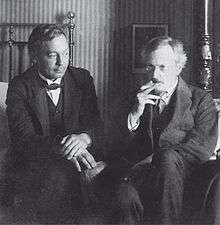J. V. Uspensky
James Victor Uspensky (April 29, 1883 – January 27, 1947) was a Russian and American mathematician notable for writing Theory of Equations.[2][3]
J. V. Uspensky | |
|---|---|
 Delaunay (left) with Uspensky | |
| Born | Yakov Viktorovich Uspensky (Russian: Яков Викторович Успенский) April 29, 1883 Urga, Outer Mongolia |
| Died | January 27, 1947 (aged 63) San Francisco, United States |
| Alma mater | University of St. Petersburg |
| Scientific career | |
| Fields | Mathematics, Number theory, Probability theory |
| Institutions | Stanford University, University of Minnesota |
| Doctoral advisor | Andrey Markov [1] |
| Notable students | |
Biography
Uspensky graduated from the University of St. Petersburg in 1906 and received his doctorate from the University of St. Petersburg in 1910. He was a member of the Russian Academy of Sciences from 1921.[4]
Uspensky joined the faculty of Stanford University in 1929-30 and 1930-31 as acting professor of mathematics. He was professor of mathematics at Stanford from 1931 until his death.[4] Uspensky was the one who kept alive Vincent's theorem of 1834 and 1836, carrying the torch (so to speak) from Serret.[5]
Books
- Uspensky, J. V. (1948). Theory of equations.
- Uspensky, J. V.; Heaslet, M. A. (1939). Elementary Number Theory.
- Uspensky, J. V. (1937). Introduction to mathematical probability.
Notes
- James Uspensky on the Mathematics Genealogy Project
- J. V. Uspensky (1948). Theory of Equations. Pp. vii. 353. New York: McGraw-Hill Book Co.
- Kenneth May (1949). Book Review: Theory of Equations, by J. V. Uspensky. Popular Astronomy. 57. p. 46. .
- Royden (1988).
- Uspensky's biography (in Russian).
gollark: But on my internet connection it'd still take 2 hours to copy that off to the interweb.
gollark: I only have something like 60GB of vaguely important data, and 5GB I couldn't replace easily.
gollark: Currently looking at sending over a cheap RPi and external hard drive to a technical friend so I can replicate stuff offsite to them.
gollark: I don't have anywhere near enough backing up of stuff yet, unfortunately, really ought to work on that.
gollark: I probably get away with doing a lot of stuff weirdly because I have a lot of free time and very little actual demand on my server stuff, since the only user is me. Though I do have a lot of important data and random services.
References
- J. V. Uspensky (1931). "On Ch. Jordan's Series for Probability". Annals of Mathematics. Second Series. 32 (2): 306–312. doi:10.2307/1968193.
- J. V. Uspensky (1926–1927). "On the Development of Arbitrary Functions in Series of Hermite's and Laguerre's Polynomials". Annals of Mathematics. Second Series. 28 (1/4): 593–619. doi:10.2307/1968401.
- Halsey Royden (1988). The History of the Mathematics Department at Stanford, in A Century of Mathematics in America edited by Peter L. Duren, Richard Askey, and Uta C. Merzbach. American Mathematical Society, History of Mathematics Volume 2, Providence, Rhode Island. Link to PDF: "A History of Mathematics at Stanford" by Halsey Royden.
This article is issued from Wikipedia. The text is licensed under Creative Commons - Attribution - Sharealike. Additional terms may apply for the media files.